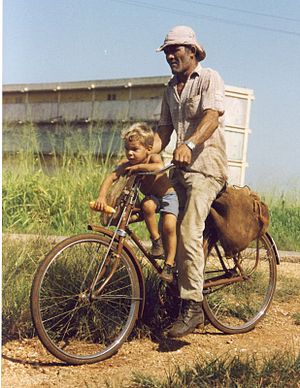The reading I picked this week is an excerpt from Rick Bragg's book "All Over But the Shoutin'." I've been trying to avoid reading or watching depressing stuff for a while now, really ever since my mom died, but the title seemed to jump out at me, so I went with it. It was sad. There's something awful about true stories that center on a terrible parent. Bragg's father is dying, and he's just the same to his son as he ever was. Bragg wants to resolve all the hurts from his childhood, but, as he's trying to come up with a way to do that, he gradually realizes that it's not going to happen.
When my mom was dying, she was in hospice care at home. We were all taking care of her, which was beautiful (I know that sounds strange, but it was beautiful in a lot of ways, mainly because she was a very good parent, definitely NOT the monster of our childhoods, and we felt as though we were doing something almost . . . holy with her--I can't think of a better way to put it) and horrible at the same time. After three or four days, she stopped talking because of the pain meds, but she was still pretty alert and reacted to what we said to her. I think we all managed to say everything we needed to say before she reached the point where she couldn't take it in. But, like Rick Bragg, I have issues that I know I will never get rid of unless I let it go, and again like him, I'm reluctant to let go, but in my case, it's because what I'd be letting go is valuable to me but so complicated and messed up that it would kind of be like trying to cut it out of myself. If that makes any sense.
Maybe you can see why I've been avoiding these stories.
This blog is meant to be used as an example for first-year composition students. Rhonda is a fictional community college student who will perpetually be taking the two-course sequence. This is her online writing and research journal (her 2012 research entries run from 1/20-5/5/2012; Eng101 reading journal that year runs from 8/22-12/5/12). For an explanation of the course, see below for Rethinking Teaching the Research Paper.
Showing posts with label father-son relationships. Show all posts
Showing posts with label father-son relationships. Show all posts
Friday, February 2, 2018
Wednesday, April 15, 2015
More on Guardians of the Galaxy: I Was on the Right Track
| Star-Lord (Photo credit: Wikipedia) |
Related articles
Sunday, March 4, 2012
Bad Dad
 Image via WikipediaI've been thinking a lot about the father-son thing. It looks to me as if Dolarhyde is responsible for all of his problems with Percy -- he's created a monster there (yeah, I know, DUH!). I think it all boils down to him being clueless about fatherhood, and that shows up best when he's interacting with Nat and the kid.
Image via WikipediaI've been thinking a lot about the father-son thing. It looks to me as if Dolarhyde is responsible for all of his problems with Percy -- he's created a monster there (yeah, I know, DUH!). I think it all boils down to him being clueless about fatherhood, and that shows up best when he's interacting with Nat and the kid.It seems that he told Percy a bunch of stories about his military experiences (Percy uses these to threaten people, talking about how his father knows how to kill people "real slow"). When Nat, with a smile, says that he remembers hearing him tell them, Dolarhyde gets angry, and says, "they were for my son!" meaning, not for Nat. Anyway, when Dolarhyde is talking to the kid, he tells him a story that no responsible adult would tell a child, and it's impossible to tell what his point is in telling the story. He seems frustrated that the kid doesn't get what he's trying to communicate, and this is probably what happened with Percy while he was growing up. What Percy got out of the stories was that his father is a badass, that he will never be as tough as his father, and that the world is a very scary place. And that's how you make a bully.
Related articles
- Robert Pattinson is Understandably Excited About His Upcoming Father-Son Orgy [Video] (jezebel.com)
- Now Available - Two Special Journals For Children Of Divorce By Psychotherapist, Dr. Percy Ricketts of Pembroke Pines, Florida (prweb.com)
- The Dad I wish I had ... (crazycutiepie.wordpress.com)
- I'm waiting for you to become a reasonable human (snoozingonthesofa.com)
- Be a Better Dad (psychcentral.com)
Saturday, February 25, 2012
My Hypothesis
 Image via WikipediaThis week, I'm supposed to be doing a QHQ (Question-Hypothesis-Question) about my research project. Here goes.
Image via WikipediaThis week, I'm supposed to be doing a QHQ (Question-Hypothesis-Question) about my research project. Here goes.Q: What's the deal with Dolarhyde, his son, and the other young males in Cowboys & Aliens? (yeah, it's not too elegant a question, but it's really my starting point)
H: Dolarhyde is looking for a more satisfying father-son relationship than he has with his son Percy. Percy is a bully, and it's pretty obvious that Dolarhyde has made him that way: he uses his clout to get Percy out of trouble, and Percy makes a lot of trouble. He does whatever he feels like doing, no matter how obnoxious or dangerous it is. In the scene where Percy (accidentally) shoots the deputy, he has already threatened everyone in town with his father's wrath, and there doesn't seem to be any doubt that his father will back him up. But when Dolarhyde shows up to get Percy out of jail, it's also clear that he doesn't think much of his son. He tells him to shut up, and ignores him while he tries to intimidate the sheriff into letting him go.
What I'd really like to know is how they got to this point, but the film doesn't offer any hints about that. So, my next question is . . .
Q: With all of Dolarhyde's more-or-less paternal interactions with the other men and the boy, what do we learn about his parenting style?
I sort of have a (or is it "an") hypothesis for that one, too, but I'll stop here for now.
Related articles
- Is it possible to prove a research hypothesis? (kfh1991.wordpress.com)
- Sleep Cycle Hypothesis of the Day (geeks.thedailywh.at)
- Lecture 3 Important Terms Used in Research (criminologymyresearch.wordpress.com)
- The Plasticity Hypothesis (andrewsullivan.thedailybeast.com)
Subscribe to:
Posts (Atom)


